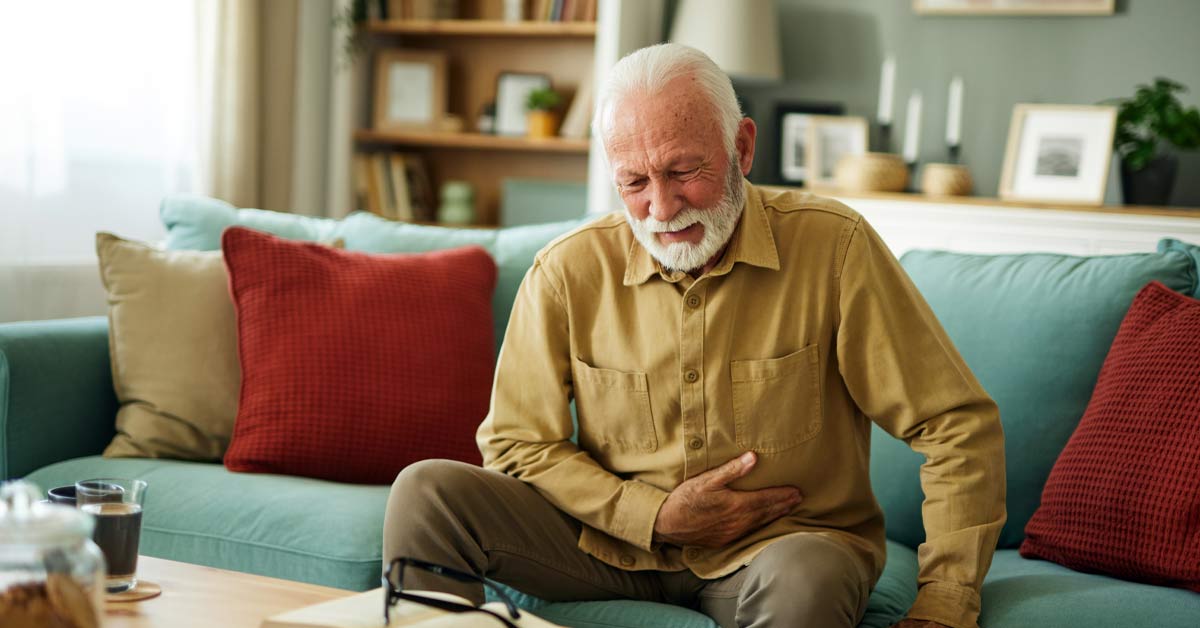
If you’re dealing with urinary problems like frequent bathroom trips or waking up at night to urinate, you may already suspect an enlarged prostate. But what if you’re also struggling with bowel changes? Many men ask, Can an enlarged prostate cause constipation?
The short answer: sometimes. The prostate isn’t part of the digestive system. But its close position to the rectum means that when it grows larger, it can add pressure that makes bowel movements more difficult. In some cases, the problem is less about the prostate itself and more about the effects of treatment and lifestyle changes.
How An Enlarged Prostate and Bowel Movements Are Connected
The prostate is located just below the bladder and directly in front of the rectum. Because of this close position, doctors can feel the gland during an exam by placing a finger into the rectum. When it becomes enlarged, the prostate presses on the urethra and sometimes expands backward toward the rectum.
When the prostate is significantly enlarged, it can create a sense of pressure or fullness in the pelvic region. For some men, this pressure makes bowel movements more difficult. In rare cases, a very large prostate can partially compress the rectum and contribute to constipation.
Can an Enlarged Prostate Cause Constipation?
An enlarged prostate can sometimes cause constipation. Constipation in men with BPH usually has more than one cause. Some of the most common reasons include:
- Pelvic pressure. An enlarged prostate can create a sense of blockage or fullness, making bowel movements feel strained.
- Medications. Drugs commonly used to manage BPH, such as anticholinergics, may slow down bowel function. This can lead to constipation.
- Reduced activity. Men with severe urinary symptoms sometimes become less active, and inactivity is a known risk factor for constipation.
- Hydration issues. Limiting fluids to control urinary frequency may lead to firmer bowel movements that are difficult to pass.
So, while the prostate itself isn’t directly causing constipation, the combination of its size, location, and the ripple effects of d and lifestyle changes can contribute.
A combination of an enlarged prostate and difficult bowel movements may cause:
- A persistent feeling of rectal fullness or pelvic pressure
- The urge to pass stool, but difficulty doing so
- Constipation that develops or worsens around the same time urinary symptoms progress
- Straining during both urination and bowel movements
These symptoms, however, can also overlap with gastrointestinal conditions. Conditions like irritable bowel syndrome (IBS), diverticulosis, or even colorectal cancer have similar symptoms. It’s important not to assume constipation is only tied to BPH.
Managing Constipation with an Enlarged Prostate
Helpful steps that help manage constipation that occurs along with BPH are:
- Staying hydrated. Even if urinary frequency is frustrating, it’s important to drink enough water to keep stools soft.
- Increasing fiber intake. Fruits, vegetables, whole grains, and fiber supplements can help regulate bowel movements.
- Exercising regularly. Walking or light activity stimulates bowel function.
- Reviewing medications. If you’re taking medicine for BPH or other conditions, ask your doctor whether they could be contributing to constipation.
- Bladder and bowel scheduling. Going to the bathroom on a routine schedule can help both systems function more smoothly.
While constipation is not the most common symptom of BPH, it can occur when an enlarged prostate presses on the rectum. It can also happen when lifestyle changes and medications used for urinary problems slow down the digestive tract.
If you are experiencing constipation along with urinary symptoms, your doctor can address both issues together. They can outline a treatment plan and ensure that nothing more serious is overlooked.
If you're asking the question, "Can an enlarged prostate cause constipation?", it's time to take action. Schedule an appointment with an experienced urologist today.
